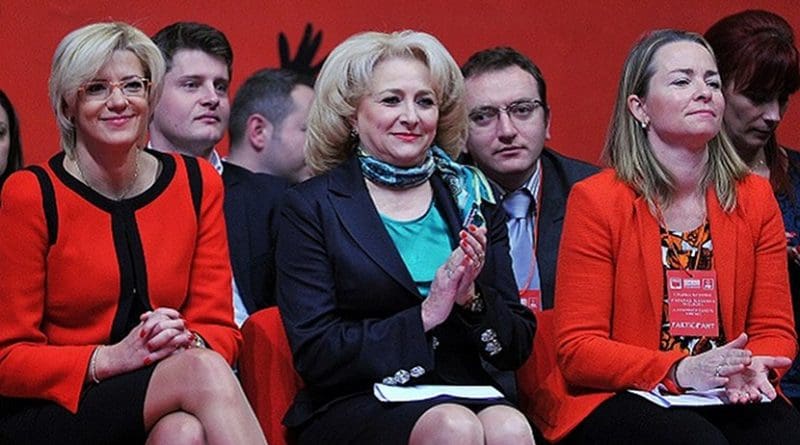Romania’s Socialists Opt For A Gender-Washing Gambit – OpEd
By Jo Simmons*
Romania’s ruling Social Democrats (PSD) are currently taking credit for a new milestone in their young democracy’s history. Last week, President Klaus Iohannis accepted their recommendation to nominate European parliamentarian Viorica Dancila as Romania’s first female prime minister.
In most countries, this would be a momentous occasion. So why is Iohannis saying he is “unhappy and concerned” with the state of Romanian politics? More importantly, why are tens of thousands protesting against the government in the streets?
To put matters quite simply, it is because Dancila’s appointment qualifies as little more than “gender-washing” by a corrupt party intent on sending its country deeper into political crisis.
Governing from the shadows
Romania has just named its third prime minister in 13 months. The man responsible for both the current troubles and Dancila’s nomination is PSD chief Liviu Dragnea, a moustachioed party boss ripped from the annals of Tammany Hall who can’t hold the top job himself because of a conviction for rigging a referendum in 2012. That’s not to mention another potential conviction over misappropriating EU funds.
After winning 2016 parliamentary elections with 46% of the vote, Dragnea has gone through a string of prime ministers to find someone willing to change the rules for him. His first move was to nominate his friend Sevil Shhaideh, a Romanian of Syrian descent, for the post and set off a rush of headlines identical to the ones greeting Dancila now.
President Iohannis killed the vibe by rejecting Shhaideh’s nomination, though, in his defence, the decision came after investigative journalists caught her Syrian husband cheerleading for Bashar al-Assad.
Dragnea has put forward and pulled back two placeholder premiers since. When Sorin Grindeanu baulked at implementing Dragnea’s changes, he was summarily dismissed by the party. When replacement Mihai Tudose fell out with Dragnea, he was forced to resign as well. The PSD boss hopes the third time will be the charm.
With Dancila, he may be in luck. In the European Parliament, she is best known for constant absenteeism and mistakenly claiming Iran and Pakistan were EU member states. Her real qualifications for the job may be her loyalty to Dragnea and outspoken support for his “reforms“. But what would those reforms entail, exactly?
Years of progress coming unstuck
Nothing good. After its accession to the EU in 2007, Romania made excellent progress in stamping out corruption among the upper echelons of government. As recently as April 2016, Romania was held up as a shining example of how to tackle corruption at the highest level. Jean-Claude Juncker even proposed taking Romania off the Cooperation and Verification Mechanism (CVM) by 2019, a vote of confidence that Europe would no longer need to actively monitor corruption in the country.
Dragnea’s PSD is attempting to take Romanian law backwards by at least a decade. Dancila will be asked to push ahead with proposals to quash prison sentences for political figures convicted of corruption (including one Liviu Dragnea) and strictly limit the power of the anti-corruption directorate, or DNA.
VICE Romania reported last year that PSD is trying to “make corruption legal” and they are not exaggerating. The proposed amendments would deal a catastrophic blow to the DNA, which has put 72 MPs (including many allies of Dragnea) on trial since 2006.
The changes would also hamstring cases against high-profile defendants outside the political sphere. Those include proceedings against businessman Alexander Adamescu, who is fighting extradition from the UK by blasting corruption allegations against himself and his late father as a “witch hunt” instigated by the ruling party and executed by the DNA. Adamescu does not explain why the PSD’s tool of political oppression goes after so many of its own members, but that hasn’t stopped the Brexiteer press from picking up the narrative.
Backlash in Bucharest
Dancila’s rise to power has seen thousands of Romanians take to the streets, but they are not there to celebrate. Each PSD move against the Romanian judiciary and governing institutions over the past year has been met with some of the biggest street protests the country has seen since Nicolae Ceauşescu was ousted from power and summarily executed in 1989.
Those demonstrations dissuaded Grindeanu and Tudose from going along with Dragnea’s programme, but the party leader himself remains undeterred. At the height of the first round of protests one year ago, when more than 500,000 Romanians were demonstrating against the government, Dragnea infamously quipped: “I don’t understand what the protesters are upset about.”
President Iohannis has also been a vocal opponent, which he rightly sees as conducive to corruption. Unfortunately, the PSD’s firm hold on parliamentary power left him little choice but to sign off on Dancila’s appointment.
With few checks left on the PSD inside Romania, Romanians may have to rely on European institutions to respond. The Council of Europe’s anti-corruption agency, Greco, has finally called out Bucharest’s failing efforts to counter corruption after launching an “urgent evaluation” of the PSD-backed judicial reform package. Unfortunately, Jean-Claude Junker and the Commission still seem inclined to take a softer line.
While Dancila helps Dragnea cripple the country’s judiciary, she will probably do little to address the serious issues facing Romanian women. That is a shame, because a strong advocate for women at the head of government could challenge public attitudes in a country where more than half of people believe in “justified rape“. Such a leader could also tackle the marginalization of women in already-marginalized communities like the Roma minority, in addition to the systemic sexual violence perpetrated against Romanian women working elsewhere in Europe.
Instead, Dancila will be asked to lay the groundwork for her political patron to take her place and be cast aside if she can’t manage it.
*Jo Simmons is a writer and consultant currently living in London.

